Categories: Blockchain
The Fastest Blockchain Technologies for Seamless, High-Speed Transactions
Discover the "Fastest Blockchain Technologies" that are setting new standards in transaction speed and efficiency. These cutting-edge solutions are revolutionizing industries by enabling rapid, secure, and scalable digital transactions, driving innovation and enhancing user experiences across various applications.
In the ever-evolving landscape of blockchain technology, the critical need for speed and scalability has never been more apparent. The fastest blockchain technologies are essential to unlocking the full potential for real-world applications, as blockchain must overcome the limitations of slow transaction speeds and inadequate scalability. These advanced capabilities are crucial for harnessing the true power of blockchain across industries, from finance to supply chain management, and beyond.
Table of Contents
Why Fast Blockchain Technologies Matter?
Overcoming Slow Transactions in Blockchain
Consider a decentralized exchange (DEX) where traders must wait minutes or even hours for their trades to be confirmed. Or imagine a supply chain management system where tracking a product's journey takes days due to sluggish transaction processing. These scenarios are not hypothetical; they represent the current reality for many blockchain-based applications.
Slow transaction speeds create a bottleneck, hindering the efficiency and usability of blockchain solutions. They limit the number of transactions that can be processed per second, leading to network congestion and high fees. This not only frustrates users but also makes it challenging for businesses to adopt blockchain technology at scale.
Industries Impacted by Slow Transaction Speeds
Decentralized Finance (DeFi): DeFi platforms rely on fast transactions for seamless trading, lending, and borrowing. Slow transaction speeds can lead to missed opportunities, price slippage, and even security risks.
Supply Chain Management: In supply chain management, real-time tracking and traceability are essential. Slow transaction speeds can delay the flow of goods, increase costs, and hinder transparency.
Gaming: Blockchain-based games require fast transactions for smooth gameplay and instant rewards. Slow transaction speeds can ruin the gaming experience and discourage players.
Other Industries: Sectors such as healthcare, real estate, and voting systems also require fast and reliable blockchain transactions to unlock their full potential.
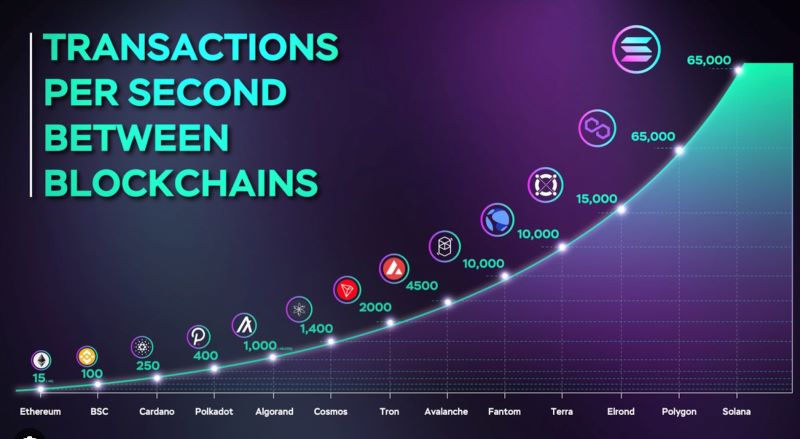
The Business Imperative for Speed
The need for speed in blockchain is not just a technical challenge; it's a business imperative. Fast blockchain technologies are essential for creating scalable, user-friendly, and commercially viable blockchain applications. By overcoming the limitations of slow transactions, blockchain can finally fulfill its promise of revolutionizing industries and transforming the way we interact with the digital world.
The Fastest Blockchain Technologies
In the quest for faster and more scalable blockchain solutions, several platforms have emerged as frontrunners, each with its unique approach to achieving high throughput and efficiency.
Solana: Blazing Fast Transactions with Proof of History
Solana has gained immense popularity due to its innovative Proof of History (PoH) consensus mechanism. PoH acts as a cryptographic clock, allowing nodes to agree on the order of events without extensive communication. This significantly reduces the time needed to validate transactions, enabling Solana to achieve incredibly high throughput, often touted as over 50,000 transactions per second (TPS).
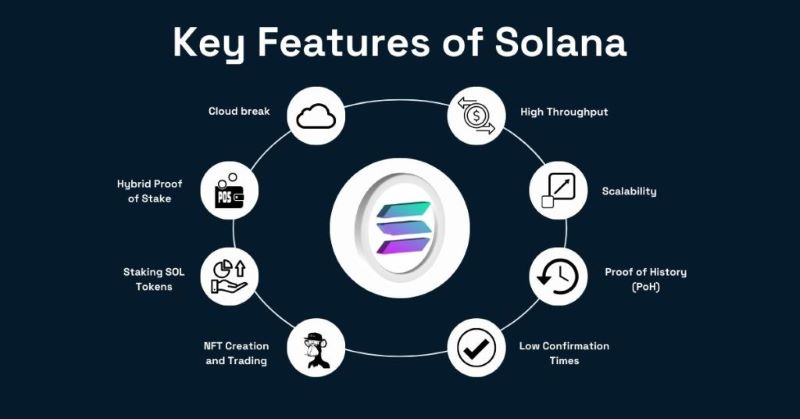
In addition to PoH, Solana's architecture incorporates various optimizations, such as the Tower BFT consensus algorithm and the Turbine block propagation protocol. These features contribute to its impressive speed and scalability, positioning Solana as a leading contender in the race for the fastest blockchain.
Avalanche: Scaling to New Heights with Subnets
Avalanche's unique subnet architecture is its key to scalability. Subnets are customizable blockchains that can operate independently, allowing for a high degree of flexibility and specialization. Each subnet can have its own consensus mechanism, virtual machine, and token, enabling a wide range of use cases.
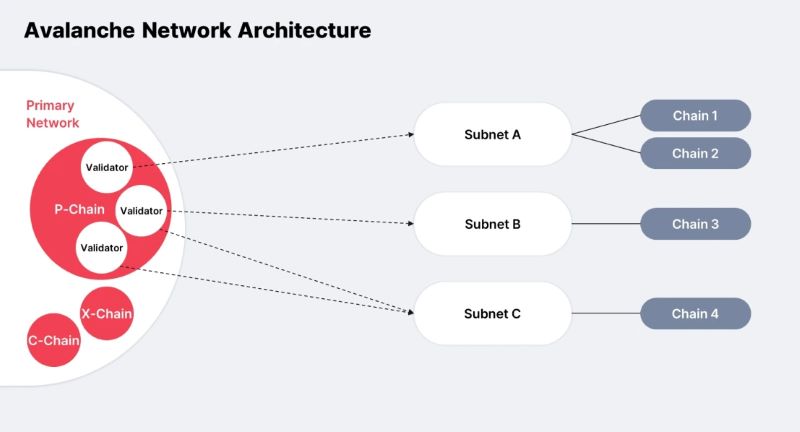
This architecture allows Avalanche to process thousands of transactions per second across multiple subnets, making it one of the fastest and most scalable blockchain platforms available. Furthermore, Avalanche's ability to bridge with other blockchains like Ethereum expands its interoperability and potential applications.
Algorand: Prioritizing Security and Decentralization with Pure Proof of Stake
Algorand takes a different approach to achieving high throughput by prioritizing security and decentralization with its Pure Proof of Stake (PPoS) consensus mechanism. PPoS randomly selects a committee of validators for each block, ensuring no single entity can control the network. This enhances security and prevents malicious actors from disrupting the blockchain.
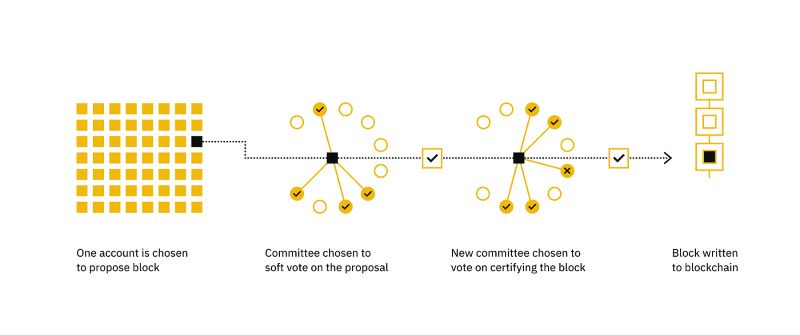
While Algorand's transaction speed may not be as high as Solana or Avalanche, its focus on security and decentralization makes it a compelling option for applications requiring trust and reliability. Additionally, Algorand's unique consensus mechanism allows for fast finality, meaning transactions are considered final almost instantly.
Other Notable Technologies
Several other blockchain platforms are also pushing the boundaries of speed and scalability. Fantom, for example, boasts high throughput and near-instant finality thanks to its Lachesis consensus mechanism. Polygon, a layer 2 scaling solution for Ethereum, significantly increases transaction speeds and reduces fees on the Ethereum network.
U2U Network
The U2U Network is an emerging player in the field of blockchain scalability, gaining traction for its innovative solutions aimed at enhancing transaction speed and throughput. While still under development, the network's focus on addressing the limitations of current blockchain technologies positions it as a potential contender in the race for the fastest blockchain.
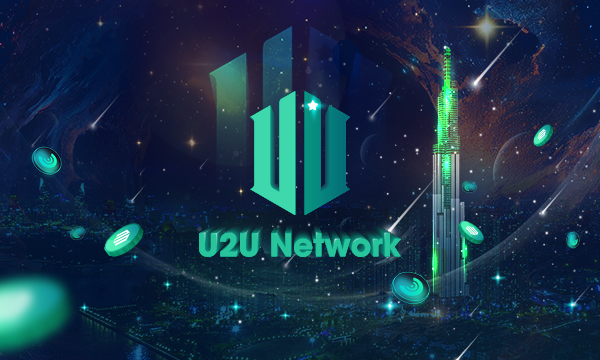
The Future of Fast Blockchain Technologies
The quest for faster blockchain technologies is far from over. As the industry continues to innovate, several promising developments are on the horizon, promising even greater speeds and scalability for blockchain applications.
Layer 2 Solutions
Layer 2 scaling solutions are protocols built on top of existing blockchains to increase their throughput and reduce transaction costs. These solutions work by processing transactions off-chain and then settling them on the main blockchain, thus reducing the load on the main network.
Two prominent layer 2 solutions are rollups and sidechains. Rollups bundle multiple transactions together and submit them as a single transaction on the main blockchain, significantly increasing throughput. Sidechains, on the other hand, are separate blockchains that run parallel to the main blockchain and can communicate with it. This allows for complex computations and transactions to be handled off-chain, further enhancing scalability.
.jpg)
U2U Network is at the forefront of blockchain innovation, developing cutting-edge technology to address the scalability challenge head-on. The network's unique architecture combines sharding, a technique for dividing the blockchain into smaller, more manageable pieces, with a novel consensus mechanism that prioritizes speed and efficiency.
This innovative approach allows U2U Network to achieve impressive transaction speeds and throughput while maintaining decentralization and security. By pushing the boundaries of blockchain scalability, U2U Network is poised to unlock new possibilities for real-world applications, from decentralized finance to supply chain management and beyond.
Industry Impact: Transforming the Way We Do Business
The potential impact of fast blockchain technologies is far-reaching, promising to transform various industries and reshape the way we interact with the digital world.
Finance: Faster blockchain transactions enable near-instantaneous settlements, revolutionizing cross-border payments, remittances, and trading. DeFi applications can offer a seamless and efficient user experience, rivaling traditional financial systems.
Gaming: High-speed blockchains power the next generation of blockchain games, enabling real-time asset ownership, secure in-game economies, and lightning-fast transactions. This opens up new opportunities for gamers and developers alike.
Supply Chain Management: Fast and transparent blockchain transactions enable end-to-end traceability, combating counterfeiting, ensuring product authenticity, and streamlining logistics processes.
Beyond: The applications of fast blockchain technologies are limitless. From healthcare to voting systems, any industry that relies on secure and efficient data management can benefit from the speed and scalability of blockchain.
Slow transaction speeds have been a major hurdle for blockchain adoption, but the emergence of the fastest blockchain technologies like Solana, Avalanche, and Algorand, along with layer 2 scaling solutions, is changing the game. These innovations are enabling a new wave of decentralized applications and services, pushing the boundaries of what's possible in industries like finance, gaming, and supply chain management.
U2U Network is at the forefront of this revolution, developing cutting-edge solutions to address scalability challenges and create a fast, efficient, and decentralized blockchain ecosystem. As the technology continues to evolve, speed and scalability will remain key drivers in determining blockchain's ultimate success, shaping the future of this transformative technology.
.png)